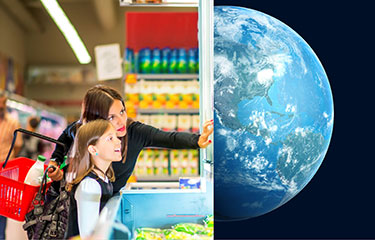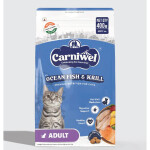Latest MSC survey indicates consumers increasingly concerned about environment, sustainability
Sponsored

The latest multi-country survey by the Marine Stewardship Council (MSC), conducted by GlobeScan, indicates that concerns related to the environment are top of mind for consumers and are becoming increasingly important, even as the world grapples with the impacts of the COVID-19 pandemic.
The survey is part of a biannual effort by the MSC to ascertain what consumers in markets across the world are concerned about and are looking for both in terms of seafood and generally. This year, the research included 23 countries – adding Portugal to the growing list of markets surveyed by MSC.
The survey took place between 31 January and 19 March, 2020, and asked a wide range of questions to determine what issues consumers were most concerned about. In total, the survey polled over 25,000 general public respondents and seafood consumers and provides a snapshot of what consumers were thinking prior to the COVID-19 pandemic.
The survey results were reviewed in a series of webinars by the MSC that highlighted three main regions: Europe, Asia, and North America. The survey found that while each region had differing environmental concerns, climate change was of most concern overall.
Across the 23 countries, an average of 53 percent of general public respondents chose climate change as one of the top environmental issues facing the world. It is the most concerning issue in nearly every market aside from China – which ranked air pollution higher – and Austria – where the pollution of rivers and streams was the most worrying issue.
The effects of climate change on the ocean, pollution of the oceans - such as concerns relating to microplastics - overfishing and the depletion of certain species are the top three ocean issues across all regions, according to seafood consumers.
“We see this increase in worry about pollution, particularly plastics. As we all have felt, this has been a very powerful dynamic, and I think an eye-opening lesson about how to organize consumers around environmental and ocean issues,” GlobeScan Director Eric Whan said.“There is another view that’s concerning as well. Nearly 30 percent of people in North America think that their favorite fish species won’t be available to eat 20 years from now.”
Despite the increasing concern, the survey also found that there is a gap between what consumers say they are willing to do to address concerns related to sustainability, and what they are actually doing. While 33 percent of consumers say they are willing to switch to a seafood brand that helps protect oceans and fish, only 23 percent say they have taken action in the last year.
The survey found a similar gap between consumers willing to use guides or apps to help choose sustainable options, versus those taking action. But despite the low engagement in accessing information sources, consumers also said they were interested in learning more about the sustainability of fish and seafood products. Of those surveyed, 88 percent indicated they want more information about products so they can be more confident they are not buying unstainable fish or seafood products. Consumers also indicated that they want more information from companies, as well as more assurances about the traceability of seafood they buy, backed by a trusted source.
That information reinforces the efforts Whole Foods Market has been taking to make choosing sustainable seafood easy, Whole Foods Market Vice President of Seafood Merchandising Wesley Rose said.
“Our approach has always been that, we’re armed with great information about our shopper and what they’re looking for. We’ve taken that knowledge and expanded, and continued to expand, our sustainable offerings,” Rose said.
Perhaps most importantly, the survey found that concerns related to ocean sustainability differ between generations, with younger seafood consumers between the ages of 18 to 34 being more likely to care about sustainability
“They want to support brands that align with their values. For us this means we are actively targeting this group and educating them further,” MSC Senior Marketing Manager Kristen Stevens said.
Younger people were also more likely to recognize sustainability labels, and were more motivated by the sustainability of products than older generations.
“This younger generation is really a perceptive group to tap,” Stevens said. “For this group, it’s clear that they do need reassurance that when they choose a product that they are not doing harm.”
Of the three markets, Europe ranked sustainability as a more important driver of seafood purchasing – rating its importance higher than price. Nomad Foods Europe Sustainability Director Annelie Selander said that the company’s own internal research has found similar trends, with health and sustainability rapidly becoming important purchase drivers.
“Taste, quality, convenience are what we call table stakes. That’s basically what you need to deliver,” Selander said. “On top of that, very similar to what you’re showing, health and sustainability are the fastest-growing motivators, and we actually expect those to become table stakes within quite the near future.”
In addition to Europe, the other two regions said the sustainability of seafood is increasingly important, and both now rank it as the sixth-most important purchase driver. Once again, sustainability issues were more important for younger generations.
“They are concerned about fish stocks, and they are concerned about the ocean. They are more ecolabel aware, and they are more likely to pay more,” Stevens said.
Sustainability concerns have shifted somewhat due to the COVID-19 pandemic. Results from GlobeScan’s Healthy and Sustainable Living Survey of general public respondents across 27 countries fielded in June of this year found that a third of consumers in North America have been greatly affected by the COVID-19 pandemic. Perhaps unsurprisingly, the pandemic is seen to be the most serious global problem.
However, even with the pandemic topping the list of concerns, climate change and the depletion of natural resources are both ranked in third and fourth place respectively, and around 7 percentage points behind the pandemic.
In addition, respondents in Europe are more concerned about the environment than COVID-19 – the top four most serious global problems in Europe are the depletion of natural resources, climate change, single-use plastic waste, and the loss of biodiversity.
Overall, both surveys provide a comprehensive look at how important sustainability is to seafood consumers and the general public globally. The results show the increasing importance of sustainability for consumers when they purchase seafood, and that the MSC is playing a central role in raising both awareness and trust when purchase decisions are being made.
Part of that increase can be partially contributed to COVID-19, Costco Wholesale Responsible Sourcing Manager Tonette Lim said.
“I think what COVID has done, as you can see from your research, has intensified the climate change, the biodiversity issue,” she said. “It’s just made people more aware that we are all in the same planet, and we are all in the same boat.”










